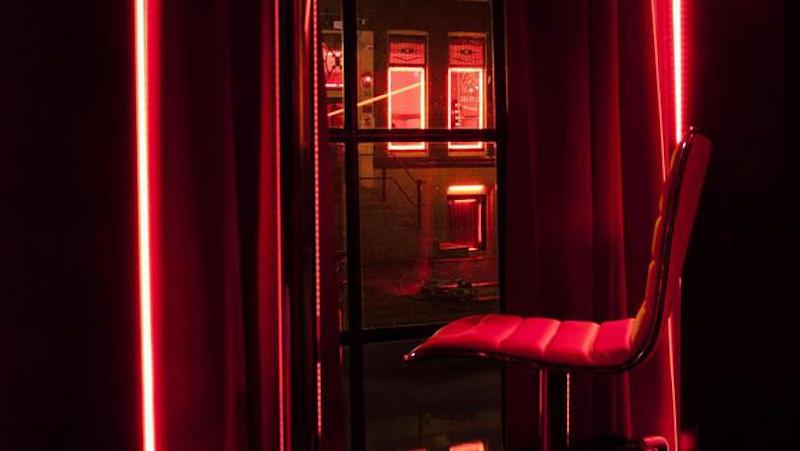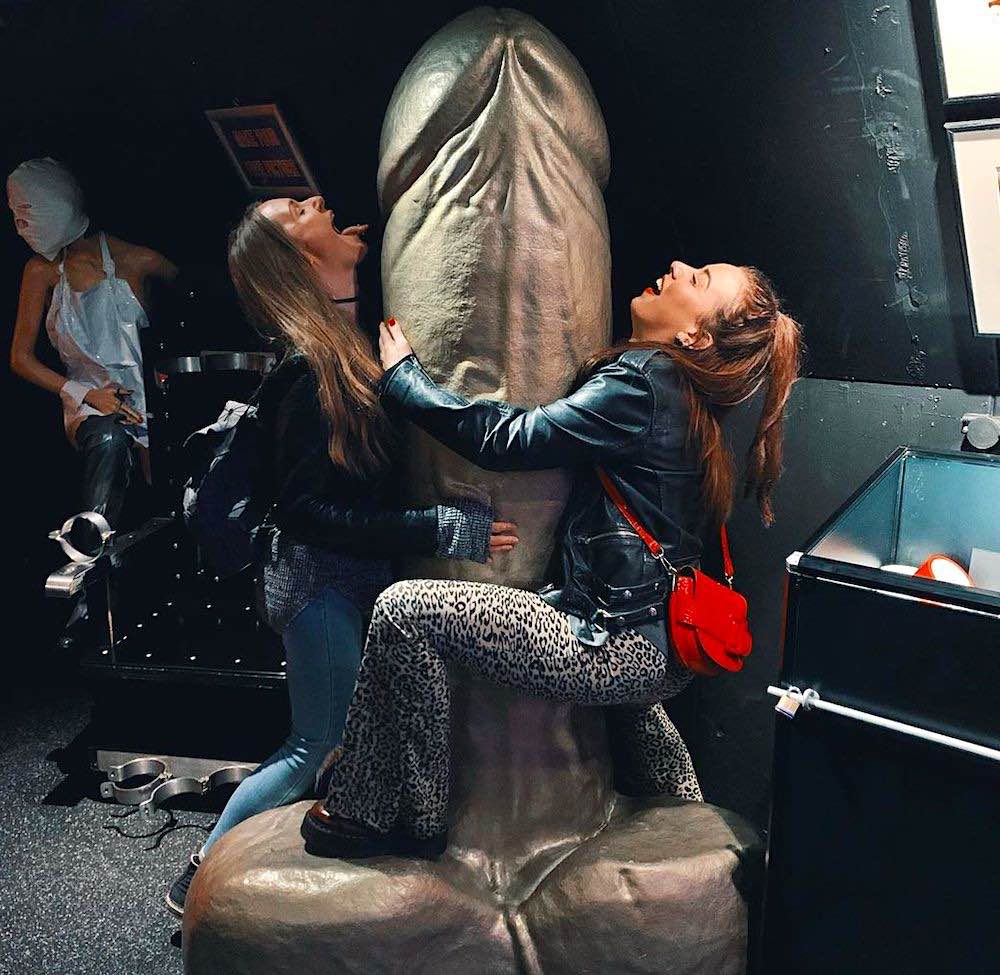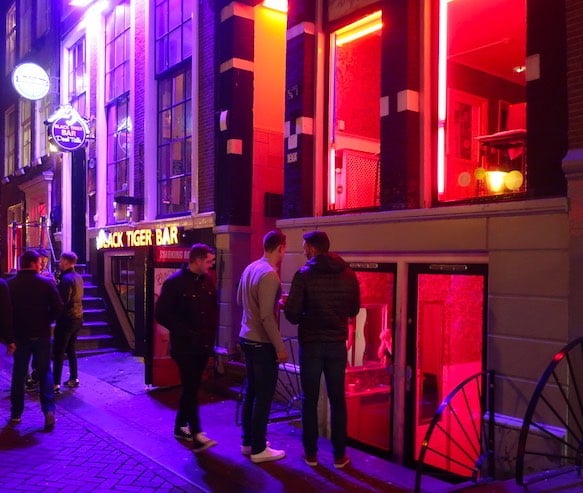An Interview With A Female Window Brothel Manager in Amsterdam
Posted on: Januar 9, 2024

Justine le Clercq On The Amsterdam Brothel Business
Back in 2016 it was announced that the Startfoundation – an independent social development company – would start working on setting up the brothel My Red Light in Amsterdam – better known as the ‘municipality brothel’.
This Amsterdam brothel was created at the initiative of the former mayor Eberhard van der Laan, with the assistance of a large number of renowned companies.
The brothel has no one owner, but is a foundation. We did an interview with the current chairwomen Justine le Clercq about the Amsterdam brothel business and the Red Light District.

Justine le Clercq in front of My Red Light – a new Amsterdam brothel.
Who is Justine le Clercq and in what ways are you involved with Amsterdam’s Red Light District?
J (Justine): I have no idea who I am; I hope to have figured it out before I pass away! How did I get involved with the Red Light District? A friend who works in the escort service directed me to it.
And because of my own past, I have always followed the developments. And I’ve always thought; well with my personal experience, if there ever comes a project where it makes sense to use my own expertise and skills, then I will do that, but not just anything.
When the My Red Light Foundation was founded, when they almost opened, they needed a press officer for 5 hours a week. Then I thought that’s okay, because not many people want to be in the media, but I was already in the media because I’m an author and I organize exhibitions and so I was already everywhere in the media, so I’m used to it.
And I have a history of drug addiction and der Prostitution angesehen werden. etc. So I thought, I felt called to it, let me put it that way.
Three weeks later I was chairwoman of the board of an Amsterdam brothel, but that’s the way things go!
For how long did you yourself work in that world as a sex worker?
J: Three years.
Did you work in Amsterdam’s Red Light District?
J: No, I was an addict, which is of course a form of prostitution that isn’t usually practiced in Amsterdam Red Light District. It was in the 1980’s when there was a lot of drug addiction in the Netherlands.
I lived in The Hague – a major city in the Netherlands – and the first 3 years that I was hooked I made ends meet by hustling, which meant stealing stuff.
When I turned 18 I thought to myself that if I got arrested, I’d have a criminal record for the rest of my life. I was very aware of that in one way or another, but I could not stop using drugs either, so I just started doing prostitution the day I turned 18.
Quite shrewd actually!
What made you decide to become a Amsterdam brothel owner?
J: No, that was not a decision. No, absolutely not. I never expected that I would do this. I’m not a career planner anyway, but this would have been complete out of the box thinking.
No, I started at My Red Light for the press officer position, I felt called because not many ladies who’ve worked in the sex industry want their face in the newspaper or on TV.
I’m an easy talker, I was already in the media and I also have the kind of career that I can’t be disappointed anymore. You are a little younger yourself, but you will understand that as you get older it becomes easier to talk about your past.
When I was twenty it was of course a completely different story compared to now.
“I feel obligated towards my own past.”
Yes, it’s a kind of commitment that I feel, I feel obligated towards my own past. That may sound a bit melodramatic, maybe it is, but you have to envision that when you were addicted in the 80’s that a lot of people died.
A lot of people died from aids, a lot of people were destroyed by their past and had no chance to rebuild a good life. I had a chance; I have an exceptionally good life.
Because of this you feel a kind of obligation to do something with it. So I came for the press officer position but when I got there there was actually hardly a board, and a foundation has to have a board.
When we opened it turned out to be a bit of a rudderless foundation. And then I was asked to be chairman of the board. I thought it was just a temporary position; well temporary has now been more than 1.5 years.
And what’s the difference between your Amsterdam brothel and a regular commercial Amsterdam brothel?
J: The most apparent difference is that we don’t make a profit. When we make a profit, then it goes to the foundation and not to the people who work there or the owner.
There is no owner at a foundation, if you have a commercial company and you’ve made a 100, – euro profit, it goes to the owner. At a foundation the money goes to the foundation.
The foundation consists of a board and it’s checked and also obliged to be consulted by all people involved in the foundation. In My Red Light’s case they’re all the sex workers.
They advise and say what they want to do with the money. So together we decide to buy new towels with this 100, – euro. Or are we going to improve the lighting? What do we do with the money? That is the most obvious difference.
“Together we decide … that is the most obvious difference.”
There are of course more differences because if you set up a foundation in the Netherlands you have to determine on paper what goals you want to achieve.
That’s not necessary with a for profit company. The goal of a company is simply to make a profit, if they have other goals then that is nice (if they’re nice goals), but it isn’t necessary.
For a foundation it’s obligated. So we have a number of goals that state that we want to contribute to normalizing and decriminalizing the sex industry.
We want to work together to develop the potential of the women, if they want to go to school, if they want to learn a profession. We want to offer them that opportunity and that they are also more proud of themselves.
We want to encourage them to take good care of themselves and be able work in a beautiful environment. We want to encourage them to lead another life alongside the industry.
You have 14 window in your Amsterdam brothel, how many sex workers are using your windows at the moment?
J: You’ll always have sex workers who have a permanent contract and that usually means that they have a window for 5 or 6 days a week.
Well, if you count then you already have 14 women who work 5 or 6 days. On the other days in the evening you have the freelancers.
These ladies are registered with us, so we have had a conversation with them and they’ve worked with us in the past. We have a total of 135 registered freelancers but we obviously don’t have enough room for 135 persons.
Some ladies have worked with us from the start but there are also a lot who travel around: Somebody leaves at a certain point and another lady replaces her full time spot for a couple of months.
Windows are mainly rented out in the evening. So I assume the 14 sex workers mainly work in the evening. How much do they rent during the day?
J: During the day we have 1 to 3 ladies who work, which is very few.
If you walk in the Red Light District during the day you’ll see that there are very few ladies at work. That’s because there are hardly any customers during the day.
There is so much tourism that showing up as a customer during the day is actually too annoying. When a customer does come by it will be in the evening hours, in the dark.
You see this during the summer months; the ladies start their shifts at a much later time because otherwise it is too light outside.
“So all the brothels are pretty empty at this time (during the day), and that’s a huge loss.”
So all the Amsterdam brothels are pretty empty at this time (during the day), and that’s a huge loss.
It’s also a loss because we only have a small number of issued permits for the sex industry and they are becoming ever more scarce. So there are fewer places for the ladies to work.
We would prefer to rent out our empty rooms to homeworkers during the day. These are ladies who do not want to stand behind a window and do not want to work in a private club but prefer to just rent a room to work in.
That isn’t allowed in the Netherlands, a lady can only work in the licensed sector. So that means a building or a place that has an issued municipality permit.
Amsterdam brothel operators are banned from renting out their rooms to ladies who don’t want to stand behind the window.
And all those sex workers are registered as homeworkers at the Dutch chamber of commerce?
J: No, all sex workers are registered under “remaining services”.
So when you register under “remaining services” then you can still… what is the difference? You go to the chamber of commerce and you register as other services than you should be able to do homework and stand behind a window, right?
J: No, it’s an important difference. A homeworker is not a window sex worker. A homeworker will never stand behind a window.
So it has nothing to do with registration but purely with personal preference?
J: Personal preference. You can do anything in the sex industry and everyone has his or her own preference.
Some like to hang from a pole, whilst others do escort with a hotel stay, another finds the Amsterdam brothel more comfortable or the streets.
Everything has it advantages and disadvantages; it’s a personal consideration. Working from home is forbidden whilst prostitution itself is a legal profession.
A physiotherapist can start a practice from home; a masseur can start a practice from home. Everyone can start a practice from home. I myself and others also work from home.
But for a prostitute this is forbidden. So what can she do? She has to find a workplace that already has a permit. Well, those are the Amsterdam brothel operators, the private clubs or the escort services.
But what if you don’t want one of those three options? What if you just want to work at home? We have everything here in the Red Light District but the windows are empty during the day.
Why not rent out these beautiful rooms that are vacant to ladies who prefer to arrange their own business. It’s a great solution? But to this day the City of Amsterdam makes it impossible because it forbids it.
How does Amsterdam forbid this?
J: The permit of a Amsterdam brothel operator states that a sex worker can only rent a room if the she solicits her customers through the window.
And that’s very strict. It’s even so strict that a sex worker cannot advertise on the Internet because she can only solicit her customers through the window.
And then you think what is this absurdity? This cannot be right? But yes, it’s true. It really is unworkable in the digital age and it’s also unrealistic.
How do sex workers find the “My Red Light” brothel?
J: Well, it’s not a question of advertising (laughter).
Ladies tell each other, of course, which brothels there are and every Amsterdam brothel, every operator, has its advantages and disadvantages.
An advantage could be, for example, the place where the window is located, but there can also be disadvantage: One room is more beautiful than the other room.
There are advantages and disadvantages so ladies look at which operator they want to work with.
“There’s a shortage of window brothels in the Red Light District.”
There’s also the question of available places. They might want to work somewhere but if there are no windows available then it stops and you have to go to another Amsterdam brothel operator.
There’s a shortage of window brothels in the Red Light District. We can say that the ladies who start working with us tend to not want to leave.
That is of course because we have a fantastic Amsterdam brothel! Much better than anyone else (laughter)! We have beautiful rooms and we are very nice, so.
And what kind of screening or preliminary procedure does your Amsterdam brothel have before you rent out a window to a sex worker?
J: Exactly the same as every other Amsterdam brothel. We all follow the same procedures.
Through an introductory meeting which consists of an official section where you have to check all papers and an unofficial part where you, you just want to know who you let enter in your house.
That’s what it comes down to. You cannot ask a too intimate question, of course, that is not the intention at all, but you want to know; gosh you want to rent here, who are you then?
Some important questions are: are you already in the sex industry or not? Because it’s quite something when someone knocks on your door and wants to start. That’s quite a different story.
Have you already stood behind a window? Have you been standing behind a window in a city like Amsterdam or a place like the Red Light District? And then: how is your situation? Are you married do you have children etc.? So here are a few important questions.
“We also try to gauge whether someone is a confident person … you do have to have a certain character to stand behind a window “
We also try to gauge whether someone is a confident person. And you notice that if they have doubts themselves and they work a night that they disappear afterwards.
You have to have real courage and a backbone to stand here. At night there are thousands of people passing by, half of them nice and the other half are totally, well, let’s say removed from any form of decency, and that’s an understatement, so it isn’t easy.
You do have to have certain character to stand behind a window in the Red Light District. And then in the weeks after their first night you try to have a lot of contact to see if things are going well.
What kind of regulations are there for Amsterdam brothel owners like yourself?
J: A LOT (laughs), which ones do you want to hear?
The important ones!
J: We have a lot of rules! And you know what’s so funny, they also make special rules just for us. Amsterdam brothel have been legalised since 2000, and that should have meant that it would have become a normal legal business, but that doesn’t mean that we are treated like it. The hospitality industry also suffers from this, they also have special rules that other entrepreneurs don’t have. Well, we have those hospitality rules too! You have to think of very strict hygiene rules, rules on cooperation and the signaling of suspicions of coercion and human trafficking. That is a very complicated regulation because it’s completely unclear who should do that, how you should do that and what actually has to be reported. Anyway, we do have that obligation. We have all kinds of obligations regarding the staff who work at our office. We have all kinds of obligations, we can’t just do something else with a room. We also rent it out sometimes for an art project or the like, well of course you need all kinds of event permits. We must of course cooperate with the police. There is also regulation and legislation around that. Well do you have some more time? (laughs)
Do the sex workers who rent your window brothels have to be tested for STD’s?
J: No, that isn’t mandatory. No, mandatory testing isn’t possible in the Netherlands either. You can insist, and yes, that’s a nice thing about the Netherlands, the care and service and the standards are so high that everyone does it. We know from other countries and big cities where there is a lot of prostitution that if there isn’t a norm for being very hygienic and getting tested that it gets neglected pretty fast. But here it comes from the government. It’s very good, it’s great. Girls do not have to go anywhere for a test. The care providers of PNG (Prostitution and Health project) just drop by with their suitcases full of things and they just ask; hey, shall we test you? So yes, everyone here gets tested. And of course it’s also true that when you come here as a new foreign sex worker and you see that everyone gets tested, then you are going to do it yourself too.
And how are things going now with My Red Light, your Amsterdam brothel?
J: It has been exciting for us from the start, and that’s actually because on the day of the opening a number of things had gone differently than what was intented on paper. We had a false start as a foundation and as a company. We had to work extra hard, but on the way we encountered even more difficulties. So it actually means that at this moment the Amsterdam brothel My Red Light is fighting to survive every day. What caused the false start? The business plan was based on two sources of income: window brothel rents during the evenings and homeworker rents during the days. We did not get a permit for homeworkers, so half of our income fell away. The second false start was that we’d hired employees for office services, which is mandatory, they call them administrators and you always have to have one administrator present at all times for the 14 windows. A few days before we opened, half of our staff was rejected by the municipality. They weren’t allowed to work for us due to past violations. So we opened with hardly any staff and financially in the red. And that was the start. You can imagine that it has been tough.
What’s your opinion on project 1012 and the closure of window brothels by the City of Amsterdam in the Red Light District?
J: I think it’s an unheard of hypocrisy. Look, that you have a kind of natural political distrust as a citizen seems normal to me, that’s also the field of tension we all act in, as a citizen you have to look critically and they look critically at us. But what I’m experiencing since working at this brothel as chairman of the board, and what I see politicians do over the backs of prostitutes, well I have led a turbulent life and I find these moves that are made by politicians and councils really outrageous. I find it unheard of and that it can all happen with the approval of the right-minded people in the Netherlands who hold key positions within our society or researchers who know perfectly well that the figures they use aren’t correct.
“prostitution touches so many strings with people that they completely go off track.”
In one way or the other, the subject of prostitution touches so many strings with people that they completely go off track. And that this can happen in a fairly restrained country like the Netherlands, where we talk things out, act rationaly and “polder”, that there is a constant secret. Project 1012 is simply a secret agenda. It’s very simple, the goal is the removel of prostitution from the Red Light District. The joke is that it’s completely obvious to everyone but no one speaks of it, those who pronounce it are not heard. That is the game. It’s not easy as a citizen to say to a respected politician that he has a secret agenda. Especially when you’re a sex worker, everyone will just roll their eyes. It seems to be that if you are, or have been a sex worker, you’re a kind of mindless amphibian who can no longer identify things or think, that is the general tenor.
“I’m disappointed in the system, even at this age.”
I’m disappointed in the system, even at this age. And working in the system, it does more with you than I’d orignally thought. The whole board, not only me but also my colleague Marcel Heyman and a third secret board member, really experienced a personal crisis because our picture of humanity and our image of society changed. It sounds very bombastic but I mean it seriously. We’ve had sleepless nights. Before this project we all had three normal and long careers. But now we were suddenly in a place where we saw that a completely different game was played. A game that was impossible to win. I can tell you if you are used to having opertunities and taking them that a guerenteed bad outcome really gives you a stomach ache.
So does project 1012 directly and indirectly ensure that the sex workers who work with you get fewer customers?
J: Of course, everyone knows that. Tourism is so gigantic these days. As a customer you try and go to the prostitute around 11:00, chances are that you have to go in under loud applause from 146 drunken Englishmen, and who wants that? Going to a prostitute is a game of eroticism and sexuality, of the forbidden but still desiring. It’s an intimate game you play from the moment you look at each other, there is a foreplay and a follow-up. You do not want that under the eyes of 1000’s of tourists. But that is not the worst. To then close down more Amsterdam brothel and to state “gosh, how is it that it’s so busy in the Red Light District?!” whilst you’ve just closed down 200 window brothels, forcing the tourists to walk around in a much smaller area. I’m stunned by this, I mean, this would an interesting case for a parliamentary inquiry. How can right-thinking people do this? That they can close down window brothels and then with each other, I’m talking about the Dutch intelligentsia, act surprised about what happens.
I think that when most people think of prostitution, one of the first things that comes to their minds is illegal or forced prostitution. How do you prevent women from being forced to work at your Amsterdam brothel?
J: I can’t, it’s as simple as that. Because a lady can say that she does not work for someone and that she does not hand over her money. I just rent out windows. So when she comes home and she gives her money to someone, I can’t see that. I don’t know if she’s in a very bad situation at home either. So we’re absolutely not free from any compulsion or human trafficking. What we do is that we build a relationship with our renters. This does not mean that we are free of these dangers, but we do see it when a women changes or when something is going on.
“It’s not always the case that if we find that there is coercion, the lady also experiences it as coercion.”
We have contact in such a way with many ladies that at some point they also tell things. In that way we can offer something extra. We can’t drag them out of that situation, of course, because that would mean using force too. And the boundary between coercion and the feeling that you still have a choice is a grey area for the girls. It’s not always the case that if we find that there is coercion, the lady also experiences it as coercion. It’s difficult matter. But we are extremely involved with them and if we signal something, we will talk to them. So that means you’re trying to lower the threshold for them to talk about it.
What do you think should be improved in the Red Light District?
J: There really should be a taskforce. I have enough ideas, no shortage of those for me, but it’s not about my ideas. There are two structural big problems where things went wrong. Number one: the political motives behind 1012 weren’t made public. They started a project where they pretended to have certain goals, but beneath the service the goals were completely different. Two: all the knowledge and skills that are present in the Netherlands weren’t consulted. How is it possible that you start a project without talking to universities where research has been done into tourist flows, how crowds of people move? A lot of research has been done about this subject, also in the other cities in Europe. How is it possible that they never sat at the table? These are the most basic of things. At this time the debate has warped into trench warfare; parties have dug themselves in and there is no sensible conversation to be had. It is beneath all levels.
“the debate has warped into the First World War. Parties have dug themselves in and there is no sensible conversation to be had.”
I see only one solution and that is a taskforce where people are obliged to commit and leave their own standards at the meeting room door and really look at the issues objectively. That starts with what Amsterdam wants with its tourism, and that’s question one. What does the City of Amsterdam want with its residents? Do they want vacancy in the city center or not? In the 1980’s we had vacancies in city center here and you know what happened to the city. Taskforce means that you first lay down a number of basic starting points for the larger urban design goals and from there you descend into how you should carry it out at the micro level. Look, and if they just honestly say we want prostitution gone from the city center, fine, but then we’re going to talk about that and we’re going to see how we can shape that policy. But do not say that you want it and then continuously work against it. I think that residents and entrepreneurs alike have just as much need for transparency. We need transparency a task force and a 15-year plan.




















